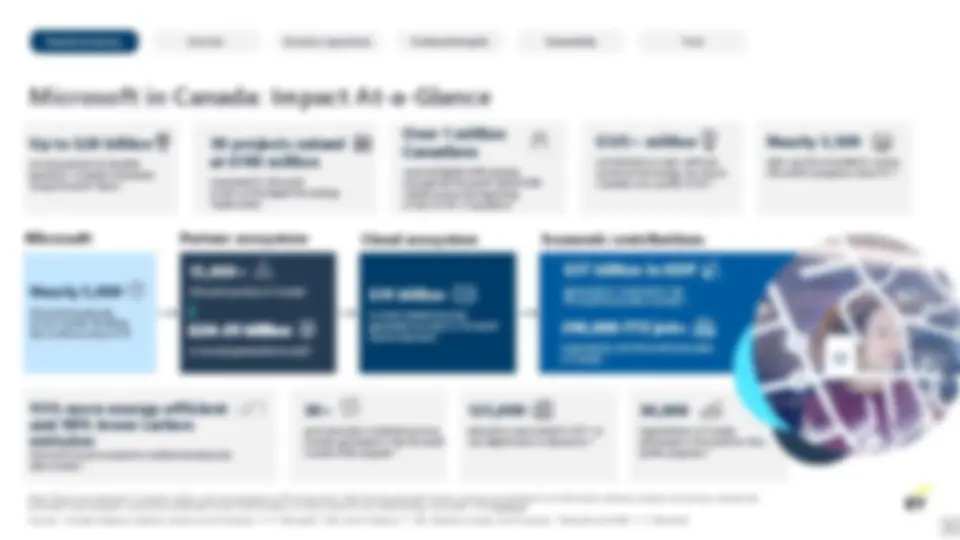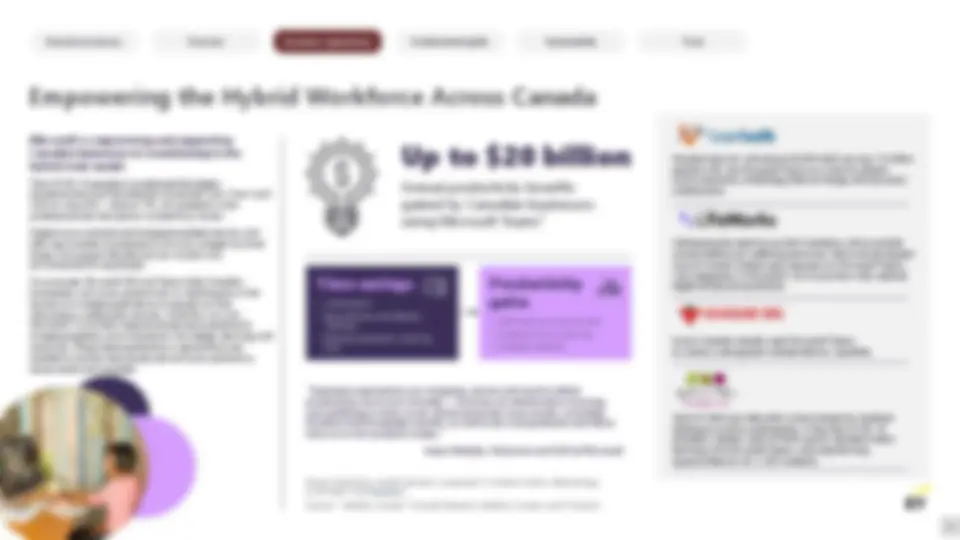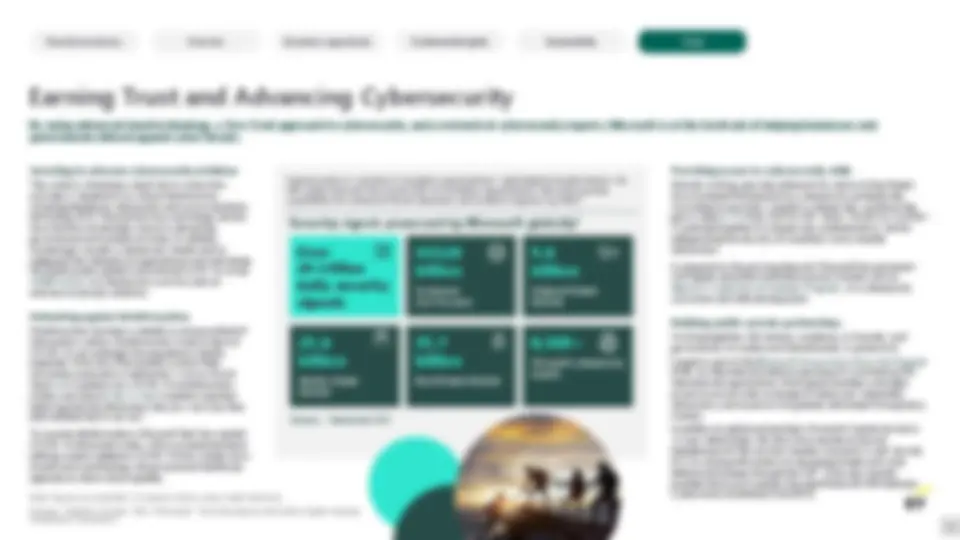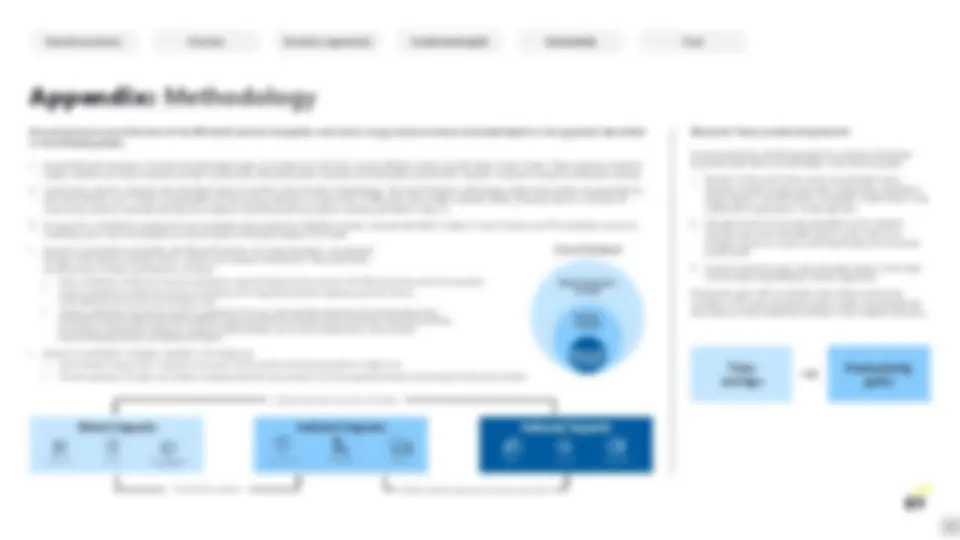Download Microsoft Canada's Impact Report: Boosting Innovation & Productivity in Canada and more Summaries Innovation in PDF only on Docsity!
Microsoft
Canada
Economic and Social
Impact Report
May 2022
Disclaimer
Ernst & Young LLP (“EY”) was engaged by Microsoft Canada Inc. (“Microsoft”) to conduct a social and economic impact study. In preparing this document (“Report”), EY relied upon
unaudited data and information from third party sources, Microsoft, associations, academic and research institutions, and the public sector (collectively, the “Supporting Information”). EY
reserves the right to revise any analyses, observations or comments referred to in this Report if additional Supporting Information becomes available to us subsequent to the release of this
Report. EY has assumed the Supporting Information to be accurate, complete and appropriate for the purposes of the Report. EY did not audit or independently verify the accuracy or
completeness of the Supporting Information. Accordingly, EY expresses no opinion or other forms of assurance in respect of the Supporting Information and does not accept any
responsibility for errors or omissions, or any loss or damage as a result of any persons relying on this Report for any purpose other than that for which it has been prepared.
Executive Summary
Ernst & Young LLP (EY) was engaged by Microsoft
Canada Inc. (Microsoft, or Microsoft Canada) to conduct
a social and economic impact study of Microsoft’s
operations and activities in Canada.
As part of the engagement, EY:
- Assessed Microsoft Canada’s contributions to the
innovation ecosystem, including economic
contributions associated with the partner networks
and cloud products.
- Estimated total contributions to the Canadian gross
domestic product (GDP) and full-time equivalent (FTE)
employment.
- Quantified the productivity benefits gained by
Canadian businesses that use Microsoft Teams.
- Evaluated Microsoft’s broader socioeconomic
contributions, including:
Economic opportunity Technology is one of the leading economic drivers of our time. Economic growth leads to higher living standards and equality of opportunity.
- The Microsoft ecosystem contributes to economic prosperity through job creation, revenue generation, and contributions to the Canadian GDP.
- Microsoft services and products enable Canadian organizations to digitally transform and transition to more efficient ways of working, while also allowing them to access new market opportunities.
- Microsoft skilling initiatives allow Canadians from all backgrounds to acquire highly marketable digital skills required for today’s digital economy. Economic and social impacts Fundamental rights Access to affordable technology and purpose-built solutions allows organizations achieve greater impact and drive equity and inclusiveness. - Microsoft is committed to working across sectors with other businesses, governments, NGOs, and change-makers to foster partnerships and solutions that will have lasting impact in solving societies’ greatest challenges. - Microsoft provides contributions in cash, cloud services solutions, and technology services to the Canadian non-profit sector to promote inclusive digital transformation. Sustainability Climate change is a defining issue of our generation, and addressing it requires swift, collective action and technological innovation.
- To minimize the environmental impacts of its operations and maximize the positive impacts of its technologies, Microsoft has made significant contributions to sustainable projects in Canada.
- Microsoft’s global sustainability commitments include reaching carbon negative, water positive, and zero waste status by 2030. Trust Cybersecurity is a priority in Canadian organizations’ rapid digital transformation. - Microsoft is at the forefront of helping governments and businesses defend cyberattacks. - To counter disinformation in the context of the COVID-19 pandemic, Microsoft Start has created COVID-19 information hubs.
- Contributions to the
start-up ecosystem
initiatives
- Digital transformation in
education and healthcare
- Advancing cybersecurity
- Community initiatives
- Sustainability programs
and partnerships
Microsoft is among the key players in the Canadian technology and innovation ecosystem that significantly contributes to the Canadian economy and
society through its partner network, the cloud ecosystem, and more generally, its support in providing digital solutions to all sectors. Microsoft's products
and solutions enable innovation in all sectors, including education and healthcare, and its programs, contributions, and initiatives support the broader
community.
Microsoft’s mission is “To empower every person and every organization on the planet to achieve more”.
30,
organizations in Canada
participate in Microsoft for Non-
profits programs^15
125,
educators were trained in 2021 to
use digital tools in classrooms^14
Microsoft in Canada: Impact At-a-Glance
Note: Figures are presented in Canadian dollars. Jobs are expressed as FTE employment. Note that the estimated partner revenues are attributed to all Microsoft’s software products and services; whereas the estimated cloud ecosystem revenues are attributed to the implementation of cloud solutions only. Methodology is provided in the Appendix. Sources: 1 Forrester Research, Statistics Canada, and EY Analysis; 2,3,4,5,6,7^ Microsoft; 8,9^ IDC and EY Analysis; 10,11^ IDC, Statistics Canada, and EY analysis; 12 Microsoft and WSP; 13,14,15^ Microsoft. Up to $20 billion
annual productivity benefits
gained by Canadian businesses
using Microsoft Teams^1
Partner ecosystem (^) Cloud ecosystem $19 billion
in cloud-related revenue
generated annually by Microsoft
cloud customers^9
290,000 FTE jobs
supported by the Microsoft ecosystem
in Canada^11
$37 billion in GDP
generated or sustained by the
Microsoft ecosystem annually^10
Nearly 5,
Microsoft employees
across Canada, doubling
the workforce since 2019^6
30 projects valued at $190 million
supported by Microsoft
as part of the Digital Technology
Supercluster^2
$125+ million
contributions in cash, software,
cloud and technology services to
Canadian non-profits in 2021^4
Over 1 million Canadians
received digital skills training
through the Microsoft Global Skills
Initiative since the beginning
of the COVID-19 pandemic^3
Nearly 3,
start-ups have enrolled in various
Microsoft’s programs since 2011^5
30+
post-secondary institutions across
Canada participate in the Microsoft
Canada Skills program^13
15,000+
Microsoft partners in Canada^7
$24-29 billion
in revenue generated annually^8
93% more energy-efficient and 98% lower carbon emission
Microsoft cloud compared to traditional enterprise
data centres^12
Microsoft Economic contributions
Supporting Economic Opportunity
The Microsoft partner ecosystem has been, and
continues to be, at the centre of how Microsoft
delivers technology, services and cloud-to-
edge solutions that enable business
transformation for customers across Canada.
A 2021 survey by the Bank of Canada found that cloud
computing is the most common technology adopted by
Canadian firms pursuing digital transformation.^1 Using
cloud technologies for data and applications allows firms
to promote growth in their services and solutions and
ensure security and reliability.
For Canadian businesses to capitalize on the benefits of
cloud adoption and digital transformation, they require a
cloud provider. For decades, Microsoft has been the cloud
provider of choice for Canadians, including the majority of
Fortune 500 companies.
Microsoft partners, including Canadian entrepreneurs,
start-ups, app builders, software development firms, and
technology companies, build tech intensity with innovative
solutions for Canadian businesses and digitally transform
workplaces to enable organizations to achieve more from
coast to coast.
Partner ecosystem 15,000+ Microsoft partners from coast to coast^2 $24-29 billion generated in revenue annually^3 Cloud ecosystem $19 billion in cloud-related revenue generated annually by Microsoft cloud customers^4 Notes: Figures are presented in Canadian dollars. Note that the estimated partner revenues are attributed to all Microsoft’s software products and services; whereas the estimated cloud ecosystem revenues are attributed to the implementation of cloud solutions only. Economic contribution results include a total of direct, indirect, and induced contributions. Methodology is provided in the Appendix. Sources: 7 1 Bank of Canada; 2 Microsoft; 3,4^ IDC and EY analysis; 5,6^ IDC, Statistics Canada, and EY analysis; Microsoft. Economic contributions 290,000 FTE jobs supported by the Microsoft ecosystem^5 $37 billion in GDP generated or sustained by the Microsoft ecosystem annually^6 Empowering Canada’s energy sector
EY Canada collaborated with Microsoft Canada
to provide energy sector companies with
customized solutions using diverse Azure cloud
services and Power BI
95% of Fortune 500 companies use Microsoft cloud^7
These include:
Empowering the Hybrid Workforce Across Canada
Microsoft is empowering and supporting
Canadian businesses in transitioning to the
hybrid work model.
The COVID-19 pandemic accelerated the digital
transformation and the adoption of remote work. From April
2020 to June 2021, close to 70% of Canadians in the
professional services sectors worked from home.^1
Digital communication technologies enabled remote work,
allowing Canadian businesses to not only mitigate revenue
losses, but support flexible and now hybrid work
environments for employees.
For example, Microsoft 365 and Teams help Canadian
businesses work more productively by breaking down the
barriers of multiple applications so people can find
information, collaborate, and stay in the flow of work.
Microsoft Viva further supports employee experience by
bringing together communications, knowledge, learning, and
resources. Using these applications, organizations are
enabled to ensure their employees are more productive,
empowered, and included.
Up to $20 billion Annual productivity benefits gained by Canadian businesses using Microsoft Teams²
“Employee expectations are changing, and we will need to define
productivity much more broadly — inclusive of collaboration, learning,
and wellbeing to drive career advancement for every worker, including
frontline and knowledge workers, as well as for new graduates and those
who are in the workforce today.”
Satya Nadella, Chairman and CEO of Microsoft
Notes: Productivity benefit estimate is presented in Canadian dollars. Methodology is provided in the Appendix. Sources: ¹ Statistics Canada; ² Forrester Research, Statistics Canada, and EY Analysis.
Spirit of Math provides after-school classes for students
seeking to excel in mathematics. When the COVID- 19
pandemic started, Spirit of Math quickly adopted online
teaching with Microsoft Teams, ensuring learning
opportunities for its 11,000 students.
Addressing the need to provide Canadians with accessible
mental health and wellbeing resources, LifeWorks developed
one of Canada's fastest-growing apps on Microsoft Teams,
with integration in Microsoft Viva to provide a fully realized
Time savings digital employee experience.
- Collaboration
- More efficient and effective meetings
- Reduced application switching time Productivity gains - Optimized work environment - Increased time for learning - Increased creativity Iconic Canadian retailer used Microsoft Teams
to create a reimagined curbside delivery capability.
Hospital network with almost 40,000 staff, serving 1.9 million
people in BC use Microsoft Teams as a hub for patient
communications, scheduling, data exchange, and physician
collaboration.
Skills for Jobs
Support post-pandemic recovery
The pandemic exacerbated the labour
shortages in many industries that had
already faced difficulties hiring. A recent
study conducted by Business
Development Bank of Canada in 2021
found that more than half of Canadian
businesses struggled to hire workers.
Nearly 44% of businesses identified the
skill shortages as the main cause for
hiring difficulty.^10 Digital upskilling,
therefore, becomes vital for business
recovery and for ensuring all Canadians
have the opportunity to pursue in-
demand jobs in a post-pandemic world.
In response to the widening skills gap and
the urgent need for digital skills,
Microsoft Canada is expanding the
Canada Skills Program and is investing
in skilling initiatives to build a sustained
pipeline of talent equipped with cloud,
data, and AI skills.
Through Canada's Digital Technology
Supercluster, Microsoft has partnered
with NPower Canada and Blueprint to
support Canada's economic recovery by
launching the Canadian Tech Talent
Accelerator project - a 15-week skills
training and job placement program that
will equip 2,500 Canadians for in-demand
digital careers.
Strengthen Canada’s innovation economy
Canada’s economy needs digital talent for innovation.
According to a study conducted by Information and
Communications Technology Council (ICTC), Canada requires
more than a-quarter million digitally skilled workers by 2025.
To bridge the digital skills gap among the workforce,
Microsoft has made significant investments in partnerships
and programs to:
- Help existing ICT talent to continue developing their skills
- Promote an environment of continued life-long learning
with customers and partners
- Ensure the future generations of educators and learners
have access to technology and skills training
- Support and connect learners to jobs Promote inclusivity
People need access to technology and digital skills
to pursue the in-demand roles of today and
tomorrow. Microsoft works to increase equal access
to broadband, technology, skills, and data
to deliver more opportunities for all communities to
thrive in an increasingly digital world.
Digital skills are highly in-demand 70%+
Jobs require basic digital skills
in today’s labour market¹
250,000+
Digitally skilled workers are
projected to be needed in the
Canadian economy by 2025^2
10%
Canadian businesses reported
difficulty hiring digital talent³
Sources: 10 ¹ Statistics Canada; ² ICTC; ³ Statistics Canada; 4,5,6,7,8,9^ Microsoft; Business Development Bank of Canada. Microsoft empowers the Canadian workforce 1 million+
Canadians have received digital
skills training through the
Microsoft Global Skills Initiative
since 2020⁴
125,
Educators in Canada were
trained in 2021 to use digital
tools in classrooms⁵
30+
Post-secondary institutions
across Canada participate in the
Microsoft Canada Skills
program⁶
90,
Customers and partners have
been equipped with the skills
needed to succeed in the digital
economy in 2021⁷
3,800+
Jobseekers were helped in
finding employment and
improve their livelihoods^8
30,000+
Students in the Microsoft
Canada Skills Program were
trained in 2021^9
Building up a talent pipeline equipped with digital skills while continuously upskilling the workforce is key to strengthening Canada’s economic
competitiveness. Microsoft invests in the future of Canadians by leading and expanding numerous skilling initiatives.
Enabling Healthcare Transformation
Source: Microsoft. Microsoft’s healthcare partners across Canada include: Transforming healthcare with digital technology
While the COVID-19 pandemic continues to cause challenges for many Canadians,
it has been a catalyst for an unprecedented digital transformation that drove
massive technological shifts, especially in the Canadian healthcare industry.
Healthcare organizations across Canada have looked to Microsoft’s ecosystem of
partners to meet their digital needs, including providing scalable and secure
solutions and enabling telework. Microsoft’s solutions helped make patient care
faster and more reliable and provided organizations with efficiency gains and
better patient outcomes.
Ontario Lakeridge Health, Niagara Health, Canadian Mental Health Association (CMHA), Nutrasource, University Health Network (UHN) Quebec CAE Healthcare, Jewish General Hospital British Columbia BC Cancer Manitoba Shared Health, St. Boniface Hospital Saskatchewan Saskatchewan Surgical Initiative Alberta Alberta Health Services Niagara Health used Azure to bring AI and voice enablement to create innovative solutions that enhance patient care. The virtual assistance provides reminders, helps enhance workflow, and gather data. PointClickCare is empowering care teams with LTC eConnect. Leveraging the power of Azure, the cloud-based program creates a streamlined, single source of patient information for care providers using robotic process automation and augmented CAE Healthcare is an industry-leading training company supplying healthcare professionals with educational tools that help them provide high-quality patient care with minimal risk. Using Microsoft Azure IoT technology, CAE developed CAE Maestro Evolve, digitizing its training offering and making it more accessible to train healthcare professionals quickly and remotely, simulating clinical experiences with a digital patient. Lakeridge Health adapted multiple Microsoft 365 and Microsoft Power Platform solutions to create a new electronic medical record (EMR) platform which led to an 800% increase in virtual care, limiting patient and staff exposure to the COVID-19 virus. Nutrasource , a nutraceutical and pharmaceutical contract research firm uses the power of Microsoft Azure AI and Power BI to turn real-world information into actionable insights for pharmaceutical and nutraceutical customers.
The pandemic has put immense pressure on Canada’s healthcare system to adopt new ways of delivering care. Microsoft and its partners have empowered healthcare providers to
deliver positive impact and improve patient outcomes.
University Health Network (UHN) leverages Microsoft Azure and AI to bridge cancer research and treatments. UHN harnesses the power of AI and cloud computing to analyze large panels of cancer cells to determine the genomic aberrations predictive of drug responses. intelligence. Patients benefit from improved complex care while care teams can access relevant information at their fingertips.
Committing to a Sustainable Future
Note: Figures are presented in Canadian dollars unless noted otherwise. Sources: 1 Microsoft and WSP; 2 Microsoft; 3 EQ Bank, ATCO, Desjardins, Microsoft, Ontario Power Generation, Evergreen, Canada’s Digital Technology Supercluster.
Microsoft’s global commitment to a sustainable future
Zero waste Across Microsoft’s direct business by 2030. Planetary Computer Build a global environmental network tool to monitor, model, and manage the world’s ecosystems and protect more land than Microsoft uses. Water positive Replenish more water than what Microsoft uses by 2030. Carbon negative Reduce and remove carbon emissions, and use renewable energy to reach carbon negative by 2030.
“Climate action can’t wait. Since 2015, Canada has been a
committed partner in the fight against climate change, and as
we move to a net-zero future, we will continue to do our part to
cut pollution and build a cleaner future for everyone. Together,
we will beat this crisis while creating a green economy and new
middle-class jobs for Canadians.”
Justin Trudeau,
Prime Minister of Canada
Benefits of Microsoft cloud^1 Relative to traditional data centres.
This results in up to 98% reduction in carbon emissions
Microsoft cloud is up to 93% more energy-efficient Microsoft initiatives and programs² US$1 billion Climate Innovation Fund to accelerate development of climate technologies globally Technology grants 42 technology grants to 29 Canadian organizations working on environmental challenges Emissions impact dashboard A dashboard to measure Microsoft cloud-based emissions and carbon-saving potential Microsoft cloud for Sustainability A new solution offering comprehensive, integrated, and automated sustainability management for organizations of all stages
Environmental protection Energy
Through the Digital Technology Supercluster, Microsoft supported the FreshWater Data Commons, a network of sensors to collect real-time data on water, climate and precipitation in British Columbia. In 2020, Evergreen worked with Microsoft and Gramener, and leveraged Microsoft Azure AI solutions to help increase visibility of environmental factors related to planned and existing infrastructure projects in Canadian cities to mitigate the effects of climate change. Ontario Power Generation is using Microsoft AI Azure for data strategy, analytics, and modelling needs to move towards a carbon-neutral future. Microsoft signed a 15-year renewable energy agreement with ATCO Group , where Microsoft will purchase all renewable energy generated by ATCO's Deerfoot solar facility in Calgary, Alberta, helping Microsoft deliver on its renewable energy commitments in Canada. Microsoft is collaborating with organizations across Canada to build a more sustainable future^3
Financial services
Equitable Bank is the first Schedule I Canadian Bank to quantify and disclose its entire Scope 3 greenhouse gas emissions portfolio, including financed emissions, partially enabled by Microsoft Azure. Desjardins partnered with Microsoft through its Open Innovation Cooperathon Challenge in 2021 to uncover how technology and AI can be used to support the development of sustainability- focused solutions.
Climate change is a defining issue of our generation, and addressing it requires swift, collective action and technological innovation. To minimize the environmental impacts of its
operations and maximize the positive impacts of its technologies, Microsoft has made significant contributions to sustainable projects in Canada and around the world.
Earning Trust and Advancing Cybersecurity
By using advanced cloud technology, a Zero Trust approach to cybersecurity, and a network of cybersecurity experts, Microsoft is at the forefront of helping businesses and
governments defend against cyber threats.
Investing to advance cybersecurity solutions
The world is witnessing a rapid rise in cybercrime
activities. Cyberattacks on critical infrastructure,
including healthcare, information and communications
technology (ICT), financial services, and energy sectors
have become increasingly common, disrupting
government and business activities. To address
increasingly complex cybersecurity threats and to
safeguard the interests of organizations and individuals,
Microsoft made a global commitment in 2021 to invest
US$20 billion in cybersecurity over five years to
advance its security solutions.
Defending against disinformation
Disinformation has been a steadily evolving method of
information warfare. Disinformation in the context of
COVID-19, can endanger the population’s health,
especially if the news that spreads is about false
prevention measures or treatments. A survey found
nearly all Canadians saw COVID-19 misinformation
online, and close to two in five Canadians reported
believing that the information they saw was true, then
later realized that it was not.^1
To counter disinformation, Microsoft Start has created
COVID-19 information hubs, with an experienced team
editing content related to COVID-19 from trusted news
brands and coordinating with government healthcare
agencies to share critical updates.
Note: Figures are presented in Canadian dollars unless noted otherwise. Sources: 1 Statistics Canada; 2 IDC; 3 Microsoft; 4 The International Information System Security Certification Consortium. Providing access to cybersecurity skills
Remote working, growing online activity and evolving threats
have increased the demand for cybersecurity professionals.
According to one study, Canada’s cybersecurity workforce has
grown nearly 21% from 2020 to 2021 (from 102,000 to 124,000).^4
A sustained pipeline of cybersecurity professionals is vital for
safeguarding the security of Canadians’ most valuable
information.
In response to the growing demand, Microsoft has partnered
with higher-education institutions across Canada, such as
Ryerson’s Cybersecure Catalyst Program , on cybersecurity
curriculum and skills development.
Building public-private partnerships
Working together with industry, academia, civil society, and
government, in Canada and internationally, is paramount.
Canada is part of the Microsoft Government Security Program
(GSP), an international initiative spanning 45 countries and 90
international organizations. Participation enables controlled
access to source code, exchange of threat and vulnerability
information, and access to five globally distributed Transparency
Centers.
In addition to global partnerships, Microsoft Canada has had a
15 - year relationship with the Communications Security
Establishment (CSE) and the Canadian Centre for Cyber Security
(CCCS), sharing information on emerging threats and cyber
defence techniques through the GSP. It has also recently
enrolled the Royal Canadian Mounted Police (RCMP) National
Cybercrime Coordination Unit (NC3).
Security signals processed by Microsoft globally^3 Over 24 trillion daily security signals US$ billion
Investment
over five years
billion
Endpoint threats
blocked
billion
Email threats blocked
8,500+
Microsoft cybersecurity
experts
billion
Identity threats
blocked
January – December 2021
Cybersecurity is a priority in Canadian organizations’ rapid digital transformation. An IDC study forecasts that nearly 50% of Canadian organizations will unify security capabilities for enhanced threat detection and incident response by 2023.^2


























